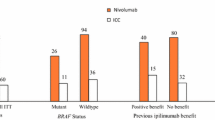Abstract
Nivolumab and relatlimab-rmbw (Opdualag™; hereafter referred to as nivolumab/relatlimab) is a fixed dose combination of monoclonal antibodies for infusion, which expands the number of available therapies against advanced melanoma in patients aged ≥ 12 years. Dual checkpoint inhibition of programmed cell death protein-1 (PD-1) by nivolumab and lymphocyte-activation gene 3 (LAG-3) by relatlimab may stimulate an immune response against tumours. Notably, relatlimab is the first approved treatment targeting LAG-3. Nivolumab/relatlimab significantly decreased the risk of disease progression or death in comparison with nivolumab monotherapy during a phase 2/3 trial. The incidence of grade 3 or 4 adverse events was higher with nivolumab/relatlimab than with nivolumab monotherapy; however, no new safety signals were detected during the trial. As with other checkpoint inhibitors, immune-mediated reactions were reported with nivolumab/relatlimab treatment, which may be managed with treatment discontinuation or systemic immunosuppressants.
Plain Language Summary
Immune responses against cancer may become ineffective, in part due to the expression of inhibitory checkpoint receptors. Checkpoint inhibitors have been successfully used in the treatment of cancer by stimulating the immune system. However, not all patients respond to current treatment due to drug resistance. Nivolumab and relatlimab-rmbw (Opdualag™; hereafter referred to as nivolumab/relatlimab) is approved for the treatment of advanced melanoma in patients aged ≥ 12 years. It contains two antibodies, with nivolumab targeting programmed cell death protein-1 and relatlimab targeting lymphocyte-activation gene 3 (LAG-3); both targets are inhibitory checkpoint receptors and relatlimab is the first approved treatment targeting LAG-3. In a clinical trial, nivolumab/relatlimab significantly decreased the risk of disease progression or death in comparison with nivolumab treatment alone. Adverse events of greater severity (i.e. grade 3 or 4) occurred more often in patients receiving nivolumab/relatlimab than nivolumab alone, although no new safety concerns were reported with nivolumab/relatlimab treatment. Reactions related to the immune system were managed by discontinuing treatment or with drugs that suppress the immune system. Nivolumab/relatlimab expands the number of available treatments for patients aged ≥ 12 years with advanced melanoma.


Similar content being viewed by others
References
Rozeman EA, Dekker TJA, Haanen JBAG, et al. Advanced melanoma: current treatment options, biomarkers, and future perspectives. Am J Clin Dermatol. 2017;19(3):303–17.
Wei Y, Li Z. LAG3-PD-1 combo overcome the disadvantage of drug resistance. Front Oncol. 2022. https://doi.org/10.3389/fonc.2022.831407.
US National Comprehensive Cancer Network. NCCN clinical practice guidelines in oncology – melanoma: cutaneous. Version 1.2023. 2022. https://www.nccn.org/. Accessed 10 Jan 2023.
Paik J. Nivolumab plus relatlimab: first approval. Drugs. 2022;82(8):925–31.
E.R. Squibb & Sons LLC. OPDUALAG™ (nivolumab and relatlimab-rmbw) injection: US prescribing information. 2022. https://dailymed.nlm.nih.gov/. Accessed 10 Jan 2023.
European Medicines Agency. Opdualag™ (relatlimab/nivolumab): EU summary of product characteristics. 2022. https://www.ema.europa.eu/. Accessed 10 Jan 2023.
Therapeutic Goods Administration. Opdualag™ (relatlimab/nivolumab): prescription medicines registration. 2022. https://www.tga.gov.au/. Accessed 10 Jan 2023.
Keating GM. Nivolumab: a review in advanced squamous non-small cell lung cancer. Drugs. 2015;75(16):1925–34.
US Food and Drug Administration. Opdualag™ (nivolumab and relatlimab-rmbw): multi-disciplinary review and evaluation (761234Orig1s000). 2020. https://www.fda.gov/. Accessed 10 Jan 2023.
Tawbi HA, Schadendorf D, Lipson EJ, et al. Relatlimab and nivolumab versus nivolumab in untreated advanced melanoma. N Engl J Med. 2022;386(1):24–34.
Long GV, Hodi FS, Lipson EJ, et al. Relatlimab and nivolumab versus nivolumab in previously untreated metastatic or unresectable melanoma: overall survival and response rates from RELATIVITY-047 (CA224-047) [abstract no. 360385]. J Clin Oncol. 2022;40(36):360385.
European Medicines Agency. Opdualag™ (relatlimab/nivolumab): EU assessment report. 2022. https://www.ema.europa.eu/. Accessed 10 Jan 2023.
Michielin O, van Akkooi ACJ, Ascierto PA, et al. Cutaneous melanoma: ESMO Clinical Practice Guidelines for diagnosis, treatment and follow-up. Ann Oncol. 2019;30(12):1884–901.
Tawbi HA, Hodi FS, Long GV. Nivolumab with or without relatlimab in untreated advanced melanoma. Reply N Engl J Med. 2022;386(19):1860–1.
Robert C. LAG-3 and PD-1 blockade raises the bar for melanoma. Nat Cancer. 2021;2(12):1251–3.
Acknowledgements
The manuscript was reviewed by: D. Y. Reuben, Medical University of South Carolina College of Medicine, Charleston, SC, USA; R. Tripathi, Department of Molecular and Biomedical Pharmacology, University of Kentucky School of Medicine, Lexington, KY, USA. During the peer review process, Bristol-Myers Squibb Company, the marketing authorization holder of nivolumab/relatlimab, was also offered an opportunity to provide a scientific accuracy review of their data. Changes resulting from comments received were made on the basis of scientific and editorial merit.
Author information
Authors and Affiliations
Corresponding author
Ethics declarations
Funding
The preparation of this review was not supported by any external funding.
Authorship and conflict of interest
A. Lee is a salaried employee of Adis International Ltd/Springer Nature and declares no relevant conflicts of interest. All authors contributed to the review and are responsible for the article content.
Ethics approval, Consent to participate, Consent for publication, Availability of data and material, Code availability
Not applicable.
Supplementary Information
Below is the link to the electronic supplementary material.
Rights and permissions
Springer Nature or its licensor (e.g. a society or other partner) holds exclusive rights to this article under a publishing agreement with the author(s) or other rightsholder(s); author self-archiving of the accepted manuscript version of this article is solely governed by the terms of such publishing agreement and applicable law.
About this article
Cite this article
Lee, A. Nivolumab/relatlimab in advanced melanoma: a profile of its use. Drugs Ther Perspect 39, 89–95 (2023). https://doi.org/10.1007/s40267-023-00980-8
Accepted:
Published:
Issue Date:
DOI: https://doi.org/10.1007/s40267-023-00980-8




